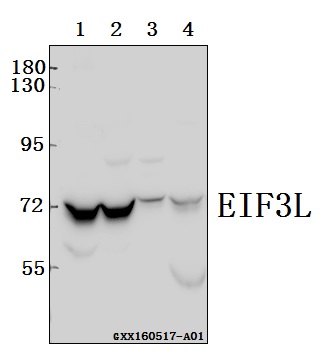Product Name :
EIF3L polyclonal antibody Background :
The initiation of protein synthesis in eukaryotic cells is regulated by interactions between protein initiation factors and RNA molecules. Eukaryotic initiation factors (eIFs) are utilized in a sequence of reactions that lead to 80S ribosomal assembly and, ultimately, translation. The eukaryotic initiation factor-3 (eIF3) scaffolding structure is the largest of the eIF complexes and includes eIF3å, eIF3∫, eIF3©, eIF3∂, eIF3ε, eIF3Ω, eIF3η and eIF3†, all of which function to control the assembly of the 40S ribosomal subunit. Association of eIF3 proteins with the 40S ribosomal subunit stabilizes eIF2-GTP-Met-tRNAiMet complex association and mRNA binding, and promotes dissociation of 80S ribosomes into 40S and 60S subunits, thereby promoting the assembly of the pre-initiation complex. Overexpression of eIF3 proteins is common in several cancers, suggesting a role for eIF3 proteins in tumorigenesis. Product :
Rabbit IgG, 1mg/ml in PBS with 0.02% sodium azide, 50% glycerol, pH7.2 Storage&Stability :
Store at 4°C short term. Aliquot and store at -20°C long term. Avoid freeze-thaw cycles. Specificity :
EIF3L polyclonal antibody detects endogenous levels of EIF3L protein. Immunogen :
Synthetic peptide, corresponding to amino acids 4-48 of Human EIF3L Conjugate :
Unconjugated Modification :
Unmodification
EIF3L polyclonal antibody Background :
The initiation of protein synthesis in eukaryotic cells is regulated by interactions between protein initiation factors and RNA molecules. Eukaryotic initiation factors (eIFs) are utilized in a sequence of reactions that lead to 80S ribosomal assembly and, ultimately, translation. The eukaryotic initiation factor-3 (eIF3) scaffolding structure is the largest of the eIF complexes and includes eIF3å, eIF3∫, eIF3©, eIF3∂, eIF3ε, eIF3Ω, eIF3η and eIF3†, all of which function to control the assembly of the 40S ribosomal subunit. Association of eIF3 proteins with the 40S ribosomal subunit stabilizes eIF2-GTP-Met-tRNAiMet complex association and mRNA binding, and promotes dissociation of 80S ribosomes into 40S and 60S subunits, thereby promoting the assembly of the pre-initiation complex. Overexpression of eIF3 proteins is common in several cancers, suggesting a role for eIF3 proteins in tumorigenesis. Product :
Rabbit IgG, 1mg/ml in PBS with 0.02% sodium azide, 50% glycerol, pH7.2 Storage&Stability :
Store at 4°C short term. Aliquot and store at -20°C long term. Avoid freeze-thaw cycles. Specificity :
EIF3L polyclonal antibody detects endogenous levels of EIF3L protein. Immunogen :
Synthetic peptide, corresponding to amino acids 4-48 of Human EIF3L Conjugate :
Unconjugated Modification :
Unmodification
-
 Western blot (WB) analysis of EIF3L polyclonal antibody at 1:500 dilution Lane1:L02 whole cell lysate(40ug) Lane2:HCT116 whole cell lysate(40ug) Lane3:The Lung lysate of Mouse(40ug) Lane4:The Liver lysate of Rat(40ug)
Western blot (WB) analysis of EIF3L polyclonal antibody at 1:500 dilution Lane1:L02 whole cell lysate(40ug) Lane2:HCT116 whole cell lysate(40ug) Lane3:The Lung lysate of Mouse(40ug) Lane4:The Liver lysate of Rat(40ug)
Bioworld Biotech only provide peptides for our antibodies and do not provide additional peptide customization services.
Price/Size :
USD 368/1mg/vial
Tips:
For phospho antibody, we provide phospho peptide(0.5mg) and non-phospho peptide(0.5mg).Describe :
Blocking peptides are peptides that bind specifically to the target antibody and block antibody binding. These peptide usually contains the epitope recognized by the antibody. Antibodies bound to the blocking peptide no longer bind to the epitope on the target protein. This mechanism is useful when non-specific binding is an issue, for example, in Western blotting (WB) and Immunohistochemistry (IHC). By comparing the staining from the blocked antibody versus the antibody alone, one can see which staining is specific; Specific binding will be absent from the western blot or IHC performed with the neutralized antibody.Formula:
Synthetic peptide was lyophilized with 100% acetonitrile and is supplied as a powder. Reconstitute with 0.1 ml DI water for a final concentration of 10 mg/ml.The purity is >90%,tested by HPLC and MS.
Storage:
The freeze-dried powder is more stable. For short time at 2-8°C. For long term storage store at -20°C.
Note :
This product is for research use only (RUO only). Not for use in diagnostic or therapeutic procedures.
 EIF3L polyclonal antibody
EIF3L polyclonal antibody  Datasheet
Datasheet COA
COA MSDS
MSDS SHIP
SHIP